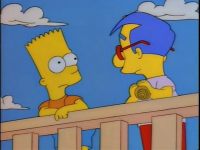I think both @MisogiKurakawa and @I Love Lisa make good points on Lisa and her "friends" (more or less), but it is definitely more of a subjective thing so I can understand both sides in this matter, in all honesty.
As for me, I don't think Lisa was initially meant to have zero friends (as we've seen in the classic era she's had friends every now and then and been part of some group; She usually hung out with Janey but also others but have also had sleepovers, as we saw in 'Flaming Moe's), but I think it is important to note and realize that while she has had some companions and friends in those dayss, they probably weren't intended to mean that she has close friends or a best friend in the truest sense, as most of her seemingly friends are more like fair-weather friends (heck, I'd say those whom Lisa was with at some point or another are more or less just that) and as we've seen in other episodes, a lot of other girls treat her as an outsider due to her opinions and intellect (that may have given some the wrong ideas).
But the more time went by, especially as the show moved on past the classic first eight or so seasons, the writers and showrunners took Lisa in a direction to emphasize how lonely she is and have a harder time making personal connections, such as becoming friends with girls of her age, and that seem to have made her isolate herself more from social circles and exhibit some troubling behavior, displaying a lot of impossibly high standards when it comes to friends, having a hard time opening up or trying to be more social and accepting of others (and at worst sitting on kind of a high horse, seeing herself as more or less "above them", thinking that no friend is good for her).
I think it's a shame that they have put so much emphasis on Lisa becoming the perpetual loner, isolating her from any potential friendships that could be possible, but at the same time I think that Lisa being the odd one out with no real close friends has kind of been a staple since the start, but her lack of socializing with others, even the usual fair-weather friends or being allowed into a friend group (even if the other members don't think much of her), is something that has been dialed back to nothingness, which is a glaring difference.
The latter may be something that has caused many fans want to see Lisa being less of the lonely one with no friends but make some connection with at least some girl and try having a meaningful friendship that isn't some superficial fair-weather thingy (and as has been argued before in other threads, I think this can be done without tearing down the aspect of Lisa being the social outsider; such as maybe finding a friend in someone else whom is an outcast, maybe a new girl whom is repeatedly ignored and afraid to speak up?).
As for me, I don't think Lisa was initially meant to have zero friends (as we've seen in the classic era she's had friends every now and then and been part of some group; She usually hung out with Janey but also others but have also had sleepovers, as we saw in 'Flaming Moe's), but I think it is important to note and realize that while she has had some companions and friends in those dayss, they probably weren't intended to mean that she has close friends or a best friend in the truest sense, as most of her seemingly friends are more like fair-weather friends (heck, I'd say those whom Lisa was with at some point or another are more or less just that) and as we've seen in other episodes, a lot of other girls treat her as an outsider due to her opinions and intellect (that may have given some the wrong ideas).
But the more time went by, especially as the show moved on past the classic first eight or so seasons, the writers and showrunners took Lisa in a direction to emphasize how lonely she is and have a harder time making personal connections, such as becoming friends with girls of her age, and that seem to have made her isolate herself more from social circles and exhibit some troubling behavior, displaying a lot of impossibly high standards when it comes to friends, having a hard time opening up or trying to be more social and accepting of others (and at worst sitting on kind of a high horse, seeing herself as more or less "above them", thinking that no friend is good for her).
I think it's a shame that they have put so much emphasis on Lisa becoming the perpetual loner, isolating her from any potential friendships that could be possible, but at the same time I think that Lisa being the odd one out with no real close friends has kind of been a staple since the start, but her lack of socializing with others, even the usual fair-weather friends or being allowed into a friend group (even if the other members don't think much of her), is something that has been dialed back to nothingness, which is a glaring difference.
The latter may be something that has caused many fans want to see Lisa being less of the lonely one with no friends but make some connection with at least some girl and try having a meaningful friendship that isn't some superficial fair-weather thingy (and as has been argued before in other threads, I think this can be done without tearing down the aspect of Lisa being the social outsider; such as maybe finding a friend in someone else whom is an outcast, maybe a new girl whom is repeatedly ignored and afraid to speak up?).
Last edited:

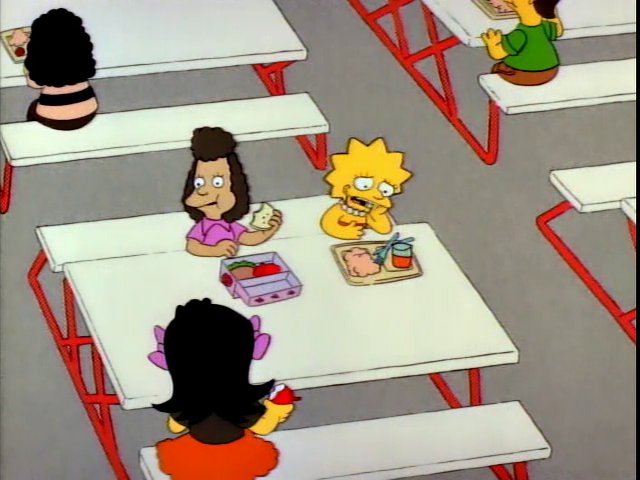
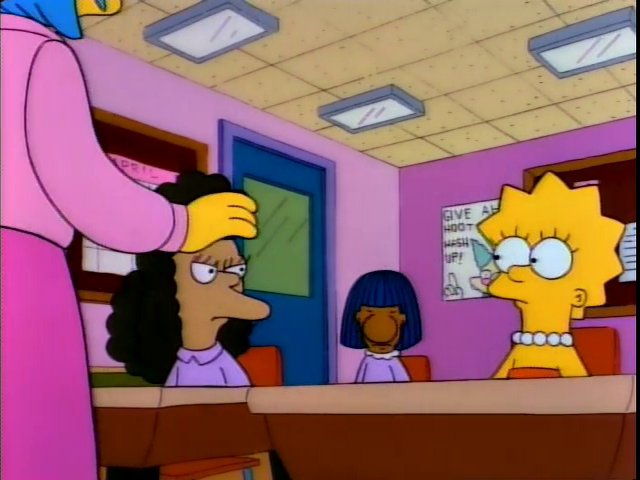
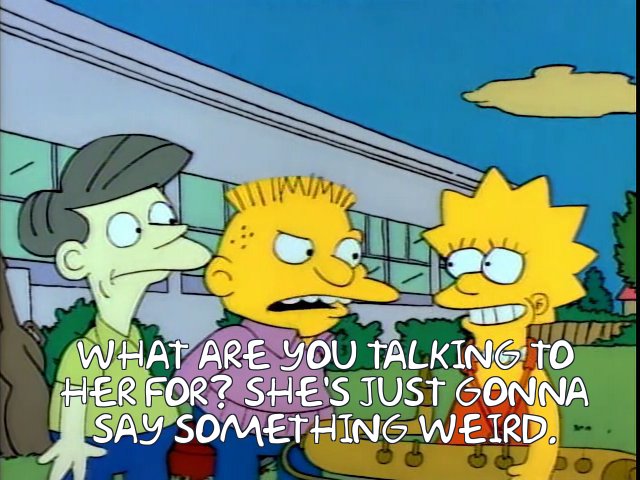
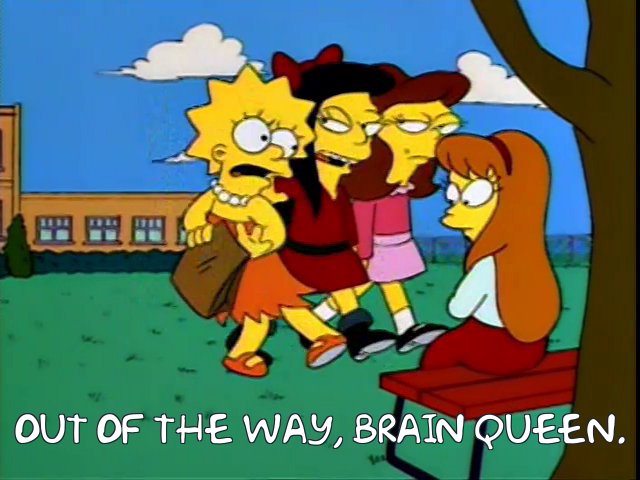
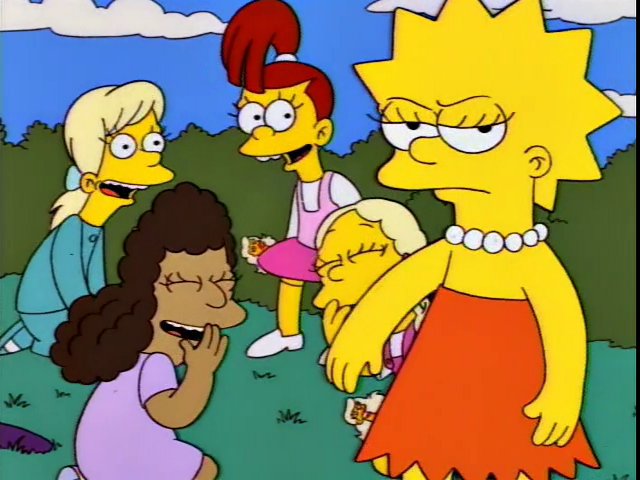
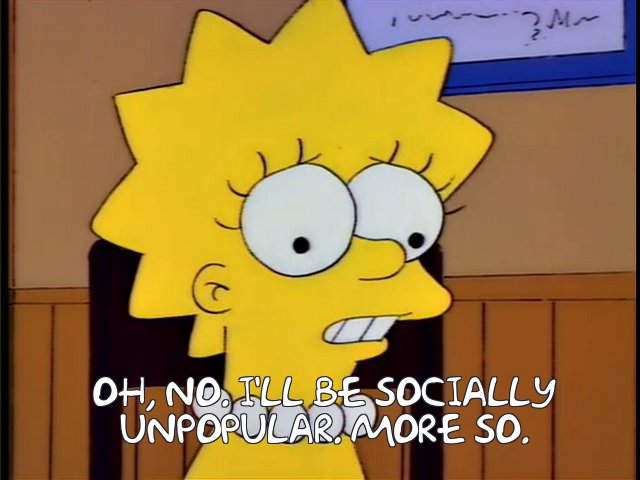
 ) so my thoughts being interesting is all I really hope for. (Also I rather like that use of the munch reaction!)
) so my thoughts being interesting is all I really hope for. (Also I rather like that use of the munch reaction!)